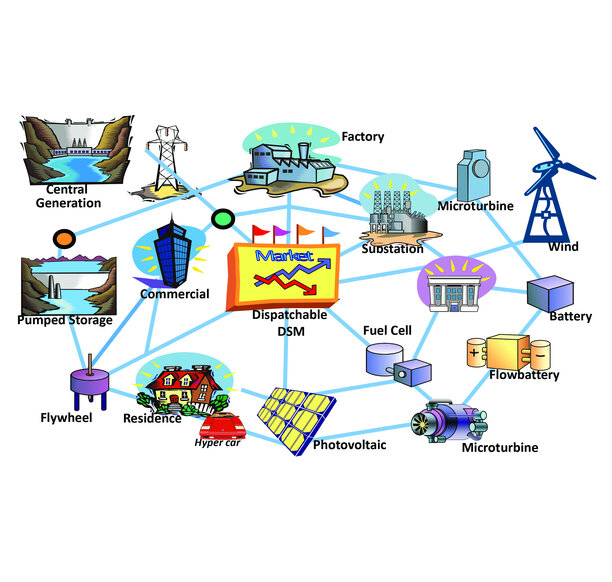Built Environment
The systems integration related research at the Built Environment department is extensive and carried out by several research groups. Firstly, the research group Building Performance aims to contribute to achieving a sustainable, energy-positive built environment. The research group adopts a multi-scale / multi-physics and trans-disciplinary approach that addresses technological solutions for energy generation, storage, distribution and demand reduction, and integrates and optimizes these in design, construction and operation of new and existing buildings. The work focuses on research, development and deployment of computational building performance simulation as an enabling technology in this context. A performance-based perspective is at the center of these activities, providing opportunities for informed decision-making in the development of designs, products and services that foster the sustainability transition. “Computational innovation steering” - using virtual prototypes and what-if analysis – is used to identify most promising future development directions of innovative technologies. Uncertainty and sensitivity analysis are used to identify the most important system properties and allow for better-informed decision-making and risk management. Secondly, the research group Building Services aims to develop design methods and adapting building services technology to ensure buildings can efficiently cater to current and future requirements, which are susceptible to fast changes. In particular, the development of a distributed building energy management system aims to support cooperation opportunities with smart power grids and local sustainable power sources. Special focus is the energy flexibility of buildings. The research group Building Physics aims to acquire new knowledge and to develop and integrate methods, based on physics research and application, that result in a sustainable, healthy, comfortable and productive indoor and outdoor environment. In relation to systems integration, the group conducts research on the aerodynamics of wind farms and on convective heat transfer of solar farms. As such, the group contributes to the optimization and design of large-scale renewable energy generation solutions. Lastly, the department of the built environment has a well-equipped Building Physics and Services laboratory of 2100 m2 with a highly qualified technical staff. Research is carried out in the laboratory as well as ‘on site’. The basic facilities allow for a wide range of experiments in all aspects of building physics: acoustics; light; air quality; heat, air and moisture transfer; wind flow; material science. The laboratory provides computing power for advanced simulation software like Fluent, ESP-r, ODEON, Insul and Radiance.
Electrical Engineering
The systems integration related research at the Electrical Engineering department is extensive and is mostly carried out by the research group ‘Electrical Energy Systems’. The research aims at transforming electricity grids towards a truly future-proof, sustainable energy supply. The group focusses on methodologies for planning, design and operation of smart medium-voltage and low-voltage networks with high amounts of renewable energy generation, storage and flexible demand. Within this group, the research program Power Grid Technologies aims to develop knowledge and tools to assess and safeguard reliability and quality of the current and future electrical. This includes research into grid components and diagnostics, power quality and EMC and (pulsed) power conversion. The research program Intelligent Power Grids includes research on power system optimization and smart grid planning, operation and optimization. The research aims to facilitate reliable information driven (control & coordination) electrical power systems. Research topics include:
- Multi-scale modeling approaches to study power systems, taking into account their growing complexity, the underlying uncertainty and risk factors, as well as the need for greater interaction between the different levels (transmission, distribution, etc.) and stakeholders, in the context of both wholesale and emerging local electricity markets. This comprises new methodologies and value-based mechanisms to integrate renewable energy and storage msystems, as well as other flexibility resources (e.g. electric vehicles, demand response) at different spatial scales (buildings, neighborhoods, cities).
- Methodologies and tools capable of exploiting in an intelligent and cost effective way large amounts of data; this is a priority in the emerging context of the ‘digitalization of energy’ for applications such as market participation strategies, demand modeling and forecasting. In this regard, the application of machine learning techniques and the exploitation of cloud-based systems is crucial
- Approaches to evaluate and enhance the reliability of the power system in the light of disruptive technology shifts that may be adopted by end-users and utilities in the near future. This comprises cases of increased reliance on energy that is locally available, new market structures and grid architectures to facilitate energy trading (e.g. meshed grids at lower voltage levels to facilitate peer-to-peer energy trading) and emerging business models such as the ones based on the principles of sharing economy
The department of Electrical Engineering has the digi-PES lab, which aims to enable the energy transition from micro energy grids towards the future integrated energy system. The laboratory environment is a cyber-physical ecosystem for students and researchers to explore innovations in various energy-related aspects of (but not limited to) nano/micro-grids, local energy communities, local flexibility/energy markets, optimal power/energy flow, or congestion management, hand-in-hand with emerging (big) data and Internet-of-Things (IoT) domains to lay a foundation for comprehensive data-drive and inter-dependencies models of energy system integration.
Mechanical Engineering
The systems integration related research at the Mechanical Engineering department is extensive and is mostly carried out by the research group Energy Technology & Fluid Dynamics (ETFD). The research aims at the advancement of heat & flow technologies for energy and high-tech applications. Research of ETFD within the scope of systems integration includes development of dynamic operational strategies for district heating (DH) networks and development of innovative energy systems that combine multiple sustainable energy technologies as geothermal energy, PV/T combi-panels and thermo-chemical energy storage into integrated next-generation energy systems for the built environment and industry. Specific research efforts at ETFD within this framework include the development of:
- Efficient CFD models for heat and mass transfer in system components with complex internal structures and transport (e.g. thermo-chemical heat-storage reactors) using dedicated simulation techniques from molecular dynamics and porous media.
- Compact models for system components using advanced techniques as neural networks trained by CFD data and model reduction of CFD models.
- Efficient system models for e.g. DH networks from integration of said compact models in powerful simulation and analysis platforms as Matlab Simulink.
- Dedicated control strategies for energy systems (e.g. adaptive pumping schemes for geothermal aquifers) using advanced methods as model-predictive control.
These efforts are supported by small-scale laboratory experiments for both model validation and model development (e.g. characterization of heat-storage materials). Moreover, their practical relevance is ensured by collaboration with developers and operators of sustainable energy systems and DH networks. ETFD research on the above topics involves collaborations with fellow research groups at TU/e with common research interests and complementary expertise as Building Performance (Dept. Built Environment) and Dynamics & Control (ME) as well as external research partners as TNO – Energy Transition Unit and Vito – Energyville.
Close

